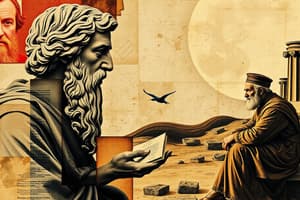Podcast
Questions and Answers
What did Socrates consider to be the true essence of a person?
What did Socrates consider to be the true essence of a person?
- The mind and its thoughts
- The emotions and feelings
- The physical body
- The immortal soul (correct)
Which aspect of human experience does Plato associate with the appetitive part of the soul?
Which aspect of human experience does Plato associate with the appetitive part of the soul?
- Spiritual aspirations
- Emotions and courage
- Desires and bodily needs (correct)
- Reasoning and wisdom
How did St. Augustine integrate Platonic philosophy into Christian thought?
How did St. Augustine integrate Platonic philosophy into Christian thought?
- By rejecting the dualism of the soul and body
- By focusing on the body as central to identity
- By emphasizing the eternal nature of the body
- By highlighting the struggle between spiritual and carnal desires (correct)
What was the primary method used by Socrates to encourage introspection and the pursuit of virtue?
What was the primary method used by Socrates to encourage introspection and the pursuit of virtue?
Which of the following correctly reflects Plato's view of the soul?
Which of the following correctly reflects Plato's view of the soul?
What is the primary assertion of Rene Descartes regarding the self?
What is the primary assertion of Rene Descartes regarding the self?
How did John Locke conceptualize personal identity?
How did John Locke conceptualize personal identity?
David Hume's perspective on the self focuses on which of the following concepts?
David Hume's perspective on the self focuses on which of the following concepts?
What distinction does Immanuel Kant make regarding the self?
What distinction does Immanuel Kant make regarding the self?
What aspect did Sigmund Freud contribute to the discussion of the self?
What aspect did Sigmund Freud contribute to the discussion of the self?
Flashcards are hidden until you start studying
Study Notes
Classical Perspectives on the Self
- Socrates emphasized the immortal soul and the importance of self-knowledge leading to wisdom; viewed the true self as the soul, not the body.
- Utilized the Socratic method of dialectical questioning to encourage introspection and the pursuit of virtue.
- Plato, Socrates' student, introduced dualism, distinguishing between the physical body and the immortal soul, which he believed pre-existed birth and survived death.
- Identified three parts of the soul:
- Rational (reasoning and wisdom)
- Spirited (emotions and courage)
- Appetitive (desires and bodily needs)
- Plato's dualism significantly influenced later philosophical and theological thought, particularly in Christianity.
Integration of Platonic Philosophy in Christianity
- St. Augustine blended Platonic ideas with Christian beliefs, focusing on the internal battle between spiritual and carnal instincts.
- He defined the true self as the soul searching for unity with God, viewing the body as a temporary vessel susceptible to sin.
- Augustine's Confessions illustrate his introspective journey and the importance of divine grace for salvation.
Modern Philosophical Views
- Rene Descartes is known for the phrase "Cogito, ergo sum" (I think, therefore I am), proposing that the self is a thinking, non-material substance.
- Argued for a clear distinction between the mind (thinking self) and the body, positioning the mind as the cornerstone of knowledge and personal identity.
- John Locke presented a contrasting view, positing that personal identity is maintained through memory and consciousness, rather than a fixed soul or body.
- Locke's ideas shifted focus from metaphysics to the psychological aspects of identity, emphasizing continuity in consciousness.
Skepticism and Radical Empiricism
- David Hume challenged the notion of a permanent self, asserting that the self is merely a collection of ever-changing perceptions, devoid of true unity.
- Declared that identity arises from sensory experiences and mental states, questioning the stability of personal identity.
Kant's Dual Aspects of Self
- Immanuel Kant differentiated between the empirical self, which is experienced in reality, and the transcendental self, essential for the experience.
- Suggested that the transcendental self unifies experiences but cannot be directly known, acting as the organizing principle for perception and knowledge.
- This duality adds depth to understanding identity, linking it to human cognition and experience.
Psychoanalytic Perspective
- Sigmund Freud, founder of psychoanalysis, developed theories explaining the self through the lens of unconscious desires and mental processes, further complicating the understanding of personal identity.
Studying That Suits You
Use AI to generate personalized quizzes and flashcards to suit your learning preferences.




